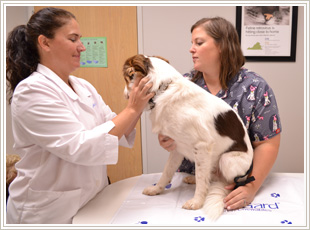Pet Wellness Exams
 Community Animal Hospital is a comprehensive, state-of-the-art veterinary care center for companion animals in Dublin, Virginia, and the entire New River Valley.
Community Animal Hospital is a comprehensive, state-of-the-art veterinary care center for companion animals in Dublin, Virginia, and the entire New River Valley.
Our model of care is based on our professional knowledge that the best means to protect your pet’s wellbeing while keeping the lifetime cost of care low is through preventative care. This includes appropriate vaccines, thorough wellness exams, dental care, nutritional and behavioral counseling, microchip lost pet ID, flea and tick control, and more.
Should your pet become ill, we are able to provide high-quality diagnostic, internal medicine, and surgical services in order to help your pet overcome his or her health challenge. Should the needs of your pet dictate referral to a specialist, Community Animal Hospital maintains close working relationships with the best specialists in our area that cover a wide range of medical modalities.
Please take a look at the services we have to offer, why we believe they are important to the health of your pet and feel free to give us a call at (540) 674-1010 to set up an appointment or ask a question.
Wellness Exams: The Basis of Preventative Care
You go to the doctor regularly, but has your pet had a recent exam?
Because our pets can’t tell us how they feel, a regular physical examination is a very important piece of your pet’s health care. Community Animal Hospital recommends a complete nose-to-tail physical examination at least once a year, though more frequent exams are encouraged.
A routine examination provides you and your veterinarian with the opportunity to develop a picture of your pet’s overall health as well as to spot potential medical issues before they become serious health concerns. It's also an opportunity for you to ask any important questions you may have about your pet’s health, habits and daily care. We also use this time to inform you about home healthcare for your pet and offer important advice and new information on the care of your particular type and breed of animal.
During your pet’s wellness checkup, your veterinarian will:
Listen to your pet’s heart – Early signs of cardiac disease such as heart murmurs and abnormal heart beat patterns known as arrhythmias can be heard through a stethoscope. Discovering these initial indicators of trouble ahead can lead to identifying and treating the underlying condition before it becomes a more serious health threat.
Listen to your pet’s lungs – Health issues such as infections, obstructive diseases and other problems can be detected by listening to your pet’s lungs through a stethoscope. The doctor can also assess the overall pulmonary health of your pet.
Check your pet’s teeth and oral cavity – Examining your pet’s teeth and mouth is an important part of preventing dental disease, which is one of the most common health concerns in pets. Very young animals, such as kittens and puppies, also need to be checked to ensure they are developing an appropriate bite and that they are losing their baby teeth at the right time. We also take the time to discuss proper home dental care with you.
Evaluate your pet’s vision – All diseases follow relatively predictable processes and if found early can be more easily treated. Ocular conditions, which can also be prevented through regular care and screenings, are no exception.
Look into your pet’s ears – As with dental disease, ear disease is relatively common in many types of pets. Issues such as low-grade allergies, swimming or bathing, reactions to certain foods, mites and other parasites can all cause and contribute to otitis or ear disease. Though you may feel this is an area that can be well-handled at home, the fact is that many ear diseases are difficult to detect and require medical treatment.
Palpate the lymph nodes, abdomen and skin – By feeling the skin, we are looking for unusual lumps or swellings as well as evaluating for skin discolorations, lesions or patterns of hair loss or thinning. These can indicate the presence of more systemic problems, especially metabolic diseases, which most commonly occur in middle-aged animals.
Palpate joints and muscles – By examining the joints, legs and other areas of the body, we are able to evaluate for swollen joints, decreased muscle tone and variations in muscle size between the limbs. We also observe your pet's gait for developmental issues. In puppies, we look for early indications of hip or elbow problems. For older pets, we look for signs of arthritis, which can be well-treated if found early.
Lab work – A complete physical should include a heartworm test, parasite screening, and a full blood workup. Not only can a full chemistry panel and complete blood count identify the presence of underlying disease processes, but these tests help create a baseline should your pet become ill between routine examinations. Additionally, blood work is necessary if your veterinarian recommends a dental cleaning, removal of skin masses, or any other procedure that requires anesthesia.





